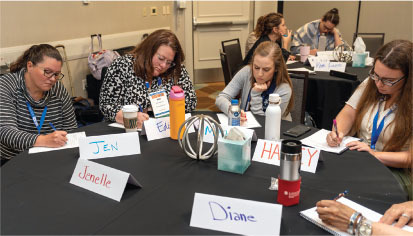April 2014
LEADING INSIGHT
Keys to Successful Leadership: A Young PE’s Perspective
What does it take be a rising star and have a successful engineering career? PE asked Scott Wolf, P.E., F.NSPE, a senior advisor at the Federal Highway Administration’s Center for Accelerating Innovation and NSPE’s Young Engineer of the Year, to share his career and leadership lessons and to provide a perspective on the issues of interest to PEs across the nation.
Why did you choose to pursue a career in engineering?
As a young boy, I was always fascinated with building and construction toys—Lincoln Logs, Tinkertoys, and Legos. I also enjoyed solving puzzles. It wasn’t until high school that I discovered the civil engineering profession and ultimately decided to pursue this career. I can’t think of a more complex puzzle than reconstructing a roadway in a developed urban corridor to reduce congestion and enhance safety while meeting stakeholder needs, and considering environmental impacts—all while satisfying regulatory requirements and remaining within a constrained budget.
What has motivated you to pursue licensure? How has licensure enhanced your career?
The importance of professional licensure was impressed upon me during college and internships. As a civil engineer specializing in transportation and working on public infrastructure projects, obtaining licensure was a given and essential to career advancement in the consultant community. Although my career path eventually took me from the private to the public sector—I am no longer intimately involved in the detailed design of projects nor have a need to stamp plans—I still maintain my licensure. I proudly display my professional engineering and professional land surveying licenses in my office and include the credentials with my name. These milestones were the culmination of years of hard work and are now a symbol of my dedication to the profession and the public that I serve.
What has been the best leadership advice you have received?
Understand that you can lead from any position and lead by example. By demonstrating your own personal commitment to a task, you will set the standard by which others can follow. A leader who leads by example is also likely to command greater respect from coworkers.
What has been the most important leadership lesson you have learned during your career?
The world and society in which we live is in a constant state of change. As such, a responsibility that will become increasingly important to anyone in a leadership role is to prepare for, adapt to, and lead through change. While all employees within an organization must be adaptive to change on some level, leaders are accountable for proactively identifying issues, establishing vision and direction, developing and implementing policies, and finally providing the framework and organizational capacity to respond to change and achieve goals.
What issue (technological, public policy, social, and/or economic) do you think is critical that the engineering community take a leadership role in addressing?
Given the importance of our transportation system to the quality of life that we have, public awareness of transportation issues is paramount. The engineering community should make public outreach and awareness of transportation issues, such as funding, more prominent in the public eye. Many people take the transportation system for granted, but are quick to point out problems such as pot holes and congestion during a daily commute. Funding for transportation improvements at both the national and state levels is critical to maintaining the safety, mobility, and quality of life that the public has come to expect and deserves. Enhancing public knowledge of the processes, procedures, and regulations that must be followed to deliver a transportation project and promoting transportation project successes would help to foster better understanding.
What should the professional engineering community do to encourage more young people to pursue an engineering career?
The engineering profession still carries with it the nerd stereotype. I think most of society does not truly understand exactly what engineers do because most of our work is performed behind the scenes. Public outreach to younger generations is necessary to educate them on not only the stability and benefits of an engineering career, but the numerous activities engineers perform for society. Engineers essentially make the world go round and this needs to be demonstrated more often than National Engineers Week.
What advice would you give to an engineering student and/or young professional engineer who wants to move up and become a leader in his or her firm or agency?
Living up to the responsibilities of a professional engineer and excelling in the profession takes strong ethics and technical ability and a host of nontechnical skills—communication, leadership, project and people management, personal management, et cetera. Effective communication is especially important because today’s business environment is filled with electronic and virtual interactions that are becoming more common. These nontechnical skills are not learned from a book. These attributes are learned and refined over time through one’s career and life experiences. Leaders in the profession must exude integrity and appreciate different skills, personalities, and behaviors.


 Volunteering at NSPE is a great opportunity to grow your professional network and connect with other leaders in the field.
Volunteering at NSPE is a great opportunity to grow your professional network and connect with other leaders in the field. The National Society of Professional Engineers (NSPE) encourages you to explore the resources to cast your vote on election day:
The National Society of Professional Engineers (NSPE) encourages you to explore the resources to cast your vote on election day: SCOTT WOLF, P.E., F.NSPE
SCOTT WOLF, P.E., F.NSPE




